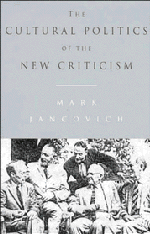Book contents
- Frontmatter
- Contents
- Preface
- List of abbreviations
- Part I The New Criticism and its critics
- Part II The formation of the New Criticism
- Part III The establishment of the New Criticism
- Part IV The development of the New Criticism
- Conclusion: Modernism and postmodernism within the American academy
- Conclusion
- Notes
- Bibliography
- Index
- Frontmatter
- Contents
- Preface
- List of abbreviations
- Part I The New Criticism and its critics
- Part II The formation of the New Criticism
- Part III The establishment of the New Criticism
- Part IV The development of the New Criticism
- Conclusion: Modernism and postmodernism within the American academy
- Conclusion
- Notes
- Bibliography
- Index
Summary
What distinguishes postmodernist criticism from modernist criticism is that while modernism sought to achieve differentiation through the creation of alternative forms, postmodernism seeks to achieve it without producing an alternative. It deconstructs existing forms but refuses the project of reconstruction. The shift from the New Critical interpretation of the text as a ‘struggle for unity and meaning’ to the postmodern rejection of totalization or meaning is not a liberating one. Rather it constitutes a rejection of social engagement and a retreat from public discussion and debate. This reconceptualization of the difference between the New Criticism and contemporary critical modes is vital. It is necessary to acknowledge that the New Criticism is not distinguished from contemporary criticism by its failure to see the text as either a linguistic process of production or as a social product. Instead we should acknowledge that both modes of criticism define the object of literary study in much the same way. The difference is that the New Critics valued the ‘struggle for meaning’ as an attempt to define a position in relation to the modern world. Postmodern criticism, on the other hand, values the ‘refusal of meaning’, and maintains that any attempt to define a position limits the productivity of language. Whatever the strengths of postmodern critiques of totalizing discourses, we cannot ‘leave open’ the question of whether postmodernism resists the logic of consumer capitalism as Jameson does. Instead we must recognize that postmodernism represents a retreat from collective social activity, and cannot provide the basis for new forms of collective struggle.
- Type
- Chapter
- Information
- Publisher: Cambridge University PressPrint publication year: 1993



